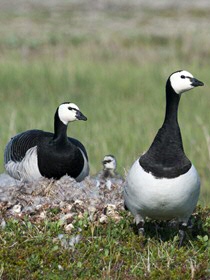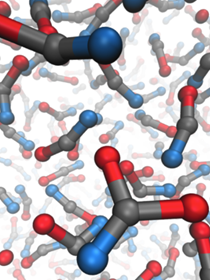Four ENW-KLEIN grants awarded to FSE researchers
In March and April, 2020, four FSE researchers have been awarded an ENW-KLEIN grant by the NWO. The ENW-KLEIN grant offers researchers the opportunity to establish scientific innovations that can form the basis for the research themes of the future.
Dr. Johannes Klein: 'Bioinspired and Environmentally Benign Halogenations'
On April 16, the NWO awarded and ENW-KLEIN grant to Dr. Johannes Klein of the Stratingh Institute for Chemistry. The grant, worth EUR 310,000, is for his project ‘Bioinspired and Environmentally Benign Halogenations’. The aim of this project is to develop new methods for the preparation of halogenated drugs and agrochemicals, which are of great importance to society. The new approach is inspired by enzymes, microscopic bio-machines that mediate similar reactions in nature.

Dr. Peter Meerlo: ‘Sleep research goes wild – new insights into sleep homeostasis from studies in geese’
Dr. Peter Meerlo of the Groningen Institute for Evolutionary Life Sciences (GELIFES) was awarded an ENW-KLEIN grant by the NWO, on April 16. The grant, worth EUR 350,000, is for his research project ‘Sleep research goes wild – new insights into sleep homeostasis from studies in geese’. We still know very little about sleep, particularly about how and when animals sleep in the wild, where time for rest and recovery is often limited. Barnacle geese, for example, are fully occupied with caring for their young in the breeding season. During their annual migration between Russia and the Netherlands, they fly for days on end. Dr. Meerlo aims to investigate questions like ‘Can they do entirely without sleep?’ and ‘Do they maybe use the same strategy as dolphins, in which one half of the brain stays awake while the other half sleeps?’ Using modern, miniaturized technology, he will measure their brain activity, to find out how they sleep under natural conditions.

Prof. Siewert-Jan Marrink: 'constant pH simulations with the MARTINI model'
For his research project on constant pH simulations with the MARTINI model, Prof. Siewert-Jan Marrink of the Groningen Biomolecular Sciences and Biotechnology Institute (GBB) has been awarded an ENW-KLEIN grant by the NWO worth EUR 350,000. Prof. Marrink will be investigating an efficient approach that allows constant pH simulations with the MARTINI model, enabling its large user community with the option to tune the computational microscope toward a large variety of pH dependent processes. The MARTINI model is a popular example of the coarse-graining approach, which has proven to be very effective as an alternative to fully atomistic models. It can be used to study large-scale processes as a function of, for instance, system composition, ionic strength, and temperature. Capturing realistic pH effects, however, is currently not possible. Existing approaches are either too slow, or only work with fully atomistic models.
Prof. George Palasantzas: ‘Surface roughness effects on DLVO forces between functionalized surfaces’
Prof. George Palasantzas of the Zernike Institute of Advanced Materials (ZIAM) has been awarded an ENW-KLEIN grant by the NWO worth EUR 304,000. The grant isfor his project ‘Surface roughness effects on DLVO forces between functionalized surfaces’. Palasantzas attempts to gain more understanding of the surface forces related to surface chemistry, morphology and material optical properties in liquid environments. He will investigate this by chemical modification (via self-assembled monolayers) of the wetting behaviour of surfaces in relation to surface roughness, optical properties, and wetting state. Surface forces are crucial in a very large number of technologically important problems and determine the behavior of many different systems.
| Last modified: | 22 April 2020 08.20 a.m. |
More news
-
03 April 2025
IMChip and MimeCure in top 10 of the national Academic Startup Competition
Prof. Tamalika Banerjee’s startup IMChip and Prof. Erik Frijlink and Dr. Luke van der Koog’s startup MimeCure have made it into the top 10 of the national Academic Startup Competition.
-
01 April 2025
NSC’s electoral reform plan may have unwanted consequences
The new voting system, proposed by minister Uitermark, could jeopardize the fundamental principle of proportional representation, says Davide Grossi, Professor of Collective Decision Making and Computation at the University of Groningen
-
01 April 2025
'Diversity leads to better science'
In addition to her biological research on ageing, Hannah Dugdale also studies disparities relating to diversity in science. Thanks to the latter, she is one of the two 2024 laureates of the Athena Award, an NWO prize for successful and inspiring...
